Composite vs. Wood Decks – Which is Best for Cincinnati Homes?
When it comes to upgrading your outdoor living space, few projects make as big an impact as a deck. But one question comes up time and again for homeowners in our area: Composite vs. Wood Decks – which is better for Cincinnati homes?
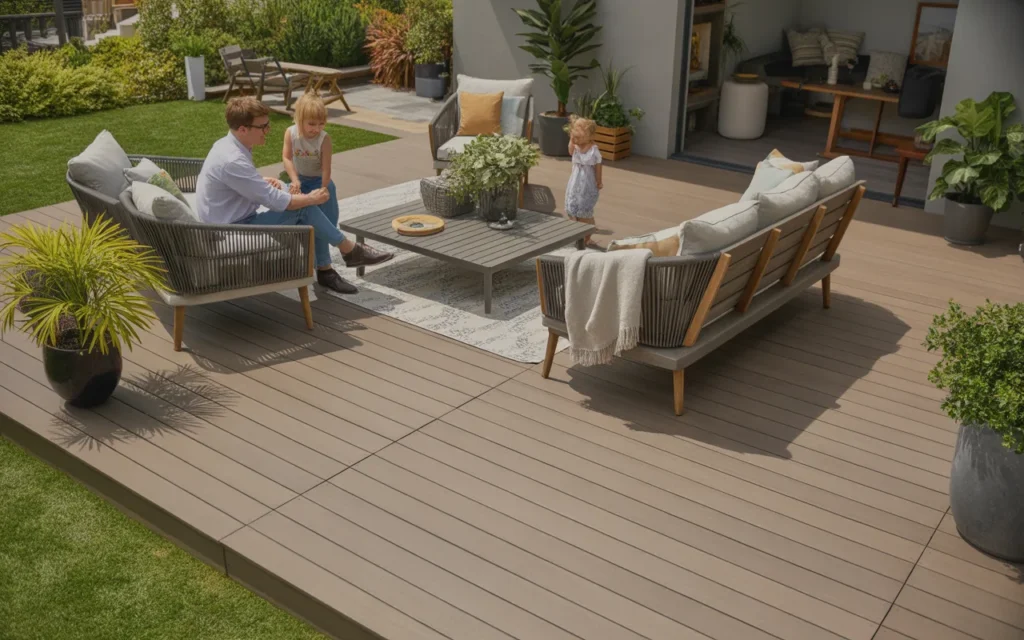
Both materials have their strengths, and the choice depends on factors like budget, maintenance, durability, and how you plan to use your deck. In this post, we’ll dive deep into the composite decking vs wood cost 2025, compare performance in Cincinnati’s climate, and help you make the right choice for your lifestyle.
Understanding Wood Decks
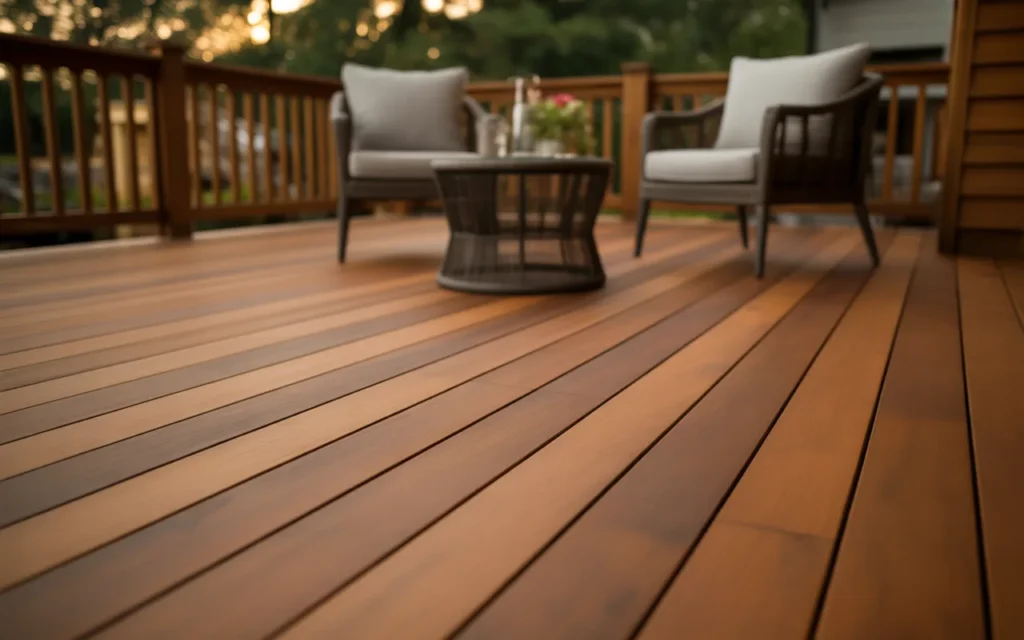
Wood decks are the classic choice, loved for their natural beauty and traditional appeal. Many Cincinnati homeowners choose pressure-treated lumber, cedar, or redwood because they’re relatively affordable and easy to customize.
Pros of Wood Decks:
- Lower upfront cost: The initial price of composite decking vs wood usually makes wood more budget-friendly.
- Classic look: Nothing beats the warm, natural grain of real wood.
- Customizable: Wood can be painted or stained in any color, giving homeowners endless options.
Cons of Wood Decks:
- Maintenance required: Wood needs regular staining, sealing, and cleaning.
- Vulnerability to weather: With Cincinnati’s humid summers and snowy winters, wood can warp, rot, or crack over time.
- Shorter lifespan: Even with maintenance, wood decks typically last 10–15 years.
Understanding Composite Decks
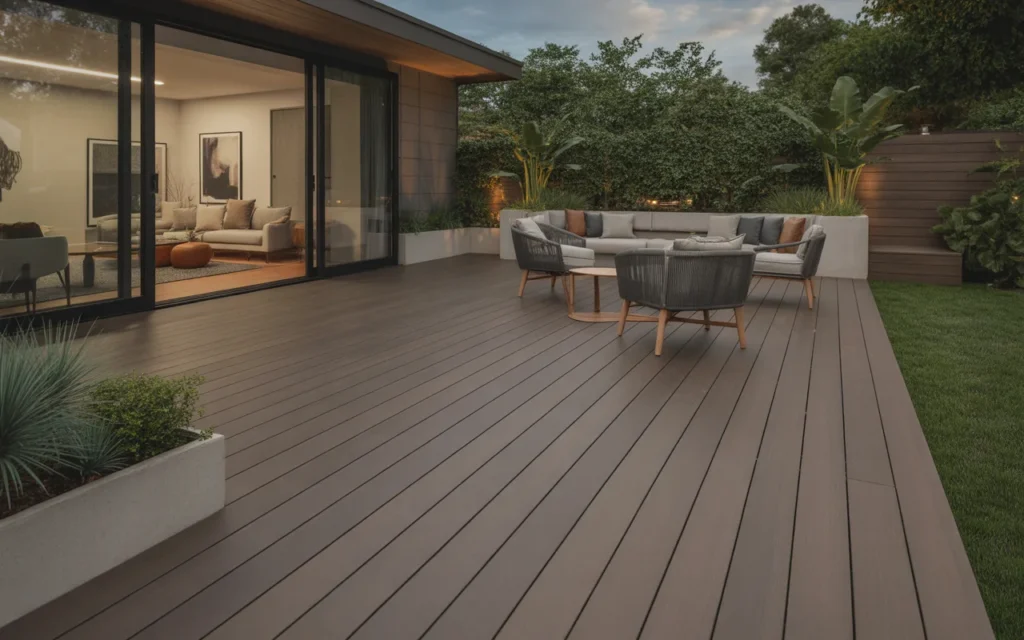
Composite decking is made from a blend of recycled wood fibers and plastic. Leading brands like Trex are engineered to mimic the look of wood while offering superior durability.
Pros of Composite Decks:
- Low maintenance: No need for staining or sealing. A quick wash keeps it looking new.
- Durability: Resistant to rot, fading, and insect damage.
- Longevity: Composite decks often last 25–30 years.
Cons of Composite Decks:
- Higher initial cost: The cost of Trex vs wood is noticeably higher upfront.
- Heat retention: In direct sun, composite materials can get hotter than wood.
- Appearance: While modern composites look realistic, purists may still prefer real wood.
Composite vs Wood Decks – Cost Comparison in 2025
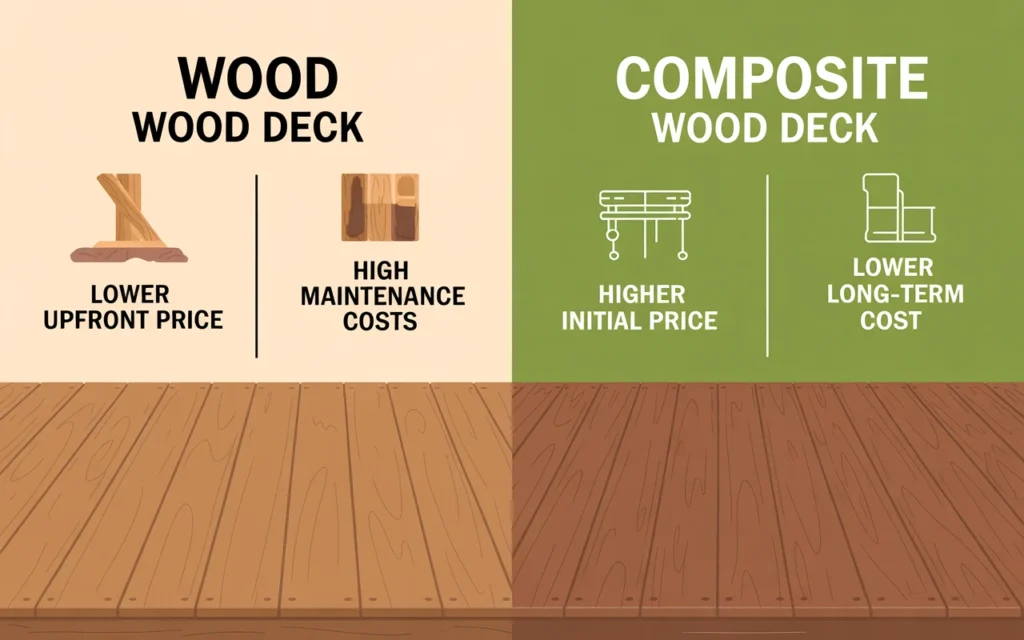
When considering composite decking vs wood cost 2025, it’s important to look beyond just the initial investment.
- Wood decking (Cincinnati average): $15–$25 per square foot installed.
- Composite decking (Cincinnati average): $30–$45 per square foot installed.
At first glance, wood seems like the obvious winner. But don’t forget maintenance. Over 10–15 years, the cost of sealing, staining, and repairing a wood deck often brings it close to (or even higher than) a composite deck.
If you’re planning to stay in your home long-term, the higher price of composite decking vs wood pays off in reduced upkeep and a longer lifespan.
Trex vs Wood Decks Cincinnati – Which Lasts Longer?
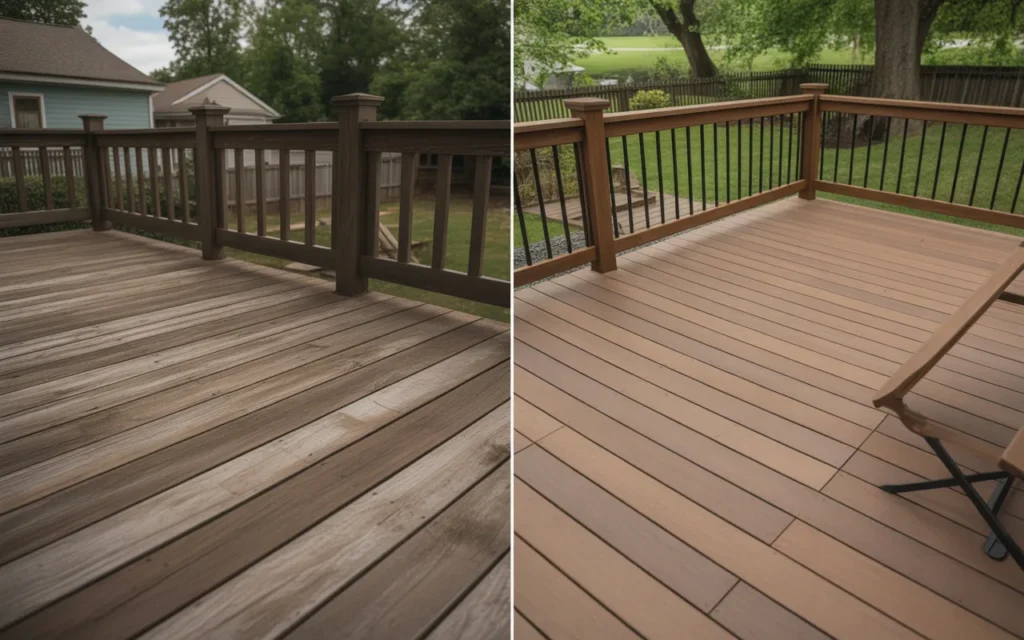
Trex is one of the most popular composite brands in the U.S., and for good reason. In the Trex vs wood decks Cincinnati debate, longevity is a huge factor.
- Wood: 10–15 years (with maintenance).
- Trex composite: 25–30 years (minimal maintenance).
For homeowners who don’t want to worry about constant upkeep, Trex is often the smarter investment.
Maintenance – A Big Deciding Factor
One of the biggest differences between composite decking vs wood decking is how much effort you’ll put into upkeep.
- Wood: Needs staining or sealing every 1–2 years. Expect sanding, replacing warped boards, and treating for pests.
- Composite: Occasional cleaning with soap and water. That’s it.
If you’d rather spend your weekends enjoying your deck instead of working on it, composite may be the best choice.
Best Decking Material Cincinnati – What to Consider
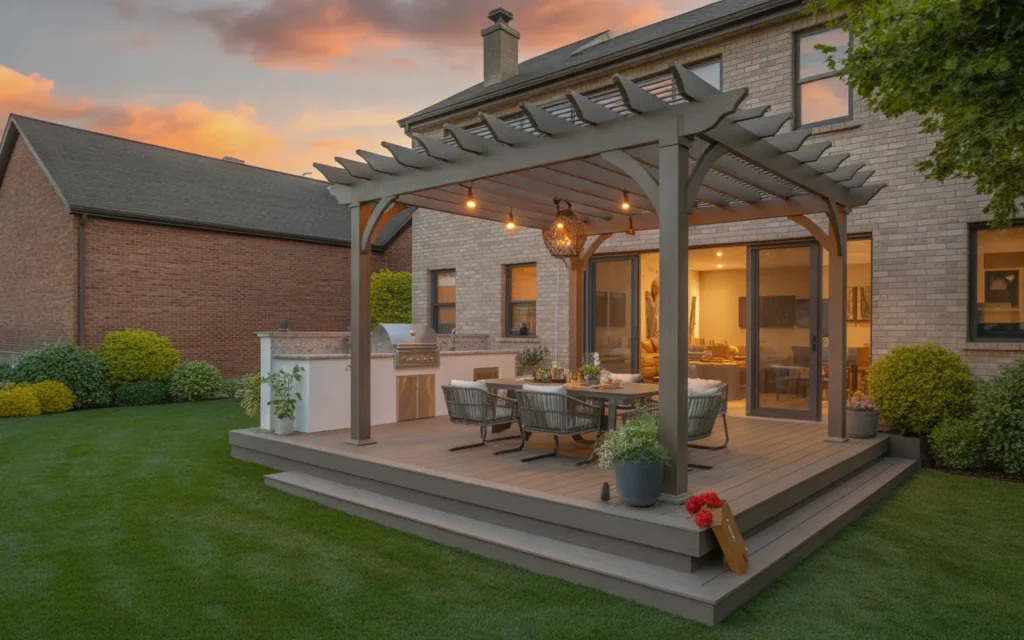
So, what’s the best decking material Cincinnati homeowners should choose? It depends on your priorities:
- Budget-conscious? Wood may be the way to go.
- Long-term investment? Composite wins for durability.
- Love natural beauty? Wood’s organic look is unmatched.
- Low-maintenance lifestyle? Composite is the clear choice.
Also, Cincinnati’s climate plays a big role. With high humidity, fluctuating temperatures, and frequent rain, wood decks often require more repairs. Composite holds up better against these conditions.
Style and Design Options
Both wood and composite offer plenty of design flexibility. With a custom deck builder in Cincinnati, you can create unique layouts, add built-in seating, or combine materials for a modern look.
- Wood design benefits: Can be cut, shaped, and painted easily. Great for custom curves or unique layouts.
- Composite design benefits: Available in a wide range of colors and textures, some nearly indistinguishable from real wood.
If you’re considering more outdoor living features, such as a screened patio or outdoor kitchen, composite decking often integrates better with these modern amenities.
Cincinnati-Specific Considerations
Local homeowners should also think about Cincinnati-specific factors:
- Weather impact: Humidity and snow shorten the lifespan of untreated wood.
- Neighborhood value: Homes with composite decks may have higher resale appeal.
- Lifestyle: Families who entertain often may appreciate the durability and low upkeep of composite.
If your deck surrounds a pool, a pool deck builder in Cincinnati might recommend composite since it’s slip-resistant and resists water damage better than wood.
When to Choose Wood
Wood is a great choice if:
- You’re on a tighter budget.
- You love the authentic look of natural wood.
- You don’t mind ongoing maintenance.
It’s also ideal for homeowners who plan to sell their home within a few years and don’t need decades of deck life.
When to Choose Composite
Composite is worth the investment if:
- You’re planning to stay in your home long-term.
- You want low-maintenance living.
- You’re looking for durability in Cincinnati’s unpredictable weather.
Composite also pairs beautifully with features like pergolas or custom decks that elevate your outdoor living space.
Final Verdict – Composite vs Wood Decks in Cincinnati
So, Composite vs Wood Decks – which is best for Cincinnati homes?
- If you’re short-term focused and budget-conscious, wood is a reliable, classic option.
- If you’re in it for the long haul and want the best return on investment, composite is hard to beat.
Either way, working with a professional deck builder in Cincinnati ensures you get the most out of your investment—whether you choose the timeless beauty of wood or the modern durability of composite.
FAQs
Is Is a composite deck better than wood?
It depends on your priorities. Composite decking is better if you want low maintenance, long lifespan, and durability in Cincinnati’s weather. Wood may be better if you prefer the natural look and lower upfront cost.
How long do composite decks last compared to wood?
Composite decks typically last 25–30 years, while wood decks usually last 10–15 years with regular maintenance.
What are the benefits of composite decking?
Composite decking offers:
- Minimal maintenance (no staining or sealing)
- Resistance to rot, mold, and insects
- Long lifespan
- Wide variety of colors and finishes
- Eco-friendly options made with recycled materials
What’s the downside of composite decking?
The biggest drawbacks are:
- Higher upfront cost compared to wood
- Can retain more heat in direct sunlight
- Less flexibility for custom cuts and stains compared to wood
Are composite decks hotter than wood?
Yes, composite can get hotter than wood under direct sunlight. However, lighter-colored composites and proper shading (like pergolas) can help reduce heat.
How much does a 20×20 composite deck cost?
In Cincinnati, a 20×20 composite deck (400 sq. ft.) typically costs between $12,000–$18,000 installed, depending on materials, design, and added features like railings or built-in seating.
Does a composite deck increase home value?
Yes. Composite decks add curb appeal and long-term value since buyers see them as low-maintenance and durable. A well-built composite deck can increase resale value more than a traditional wood deck.
Do composite decks scratch easily?
Composite decking is more resistant to scratches than wood, but it’s not completely scratch-proof. Using outdoor rugs and furniture pads helps protect the surface.
Can I replace wooden deck boards with composite?
Yes, in most cases you can replace wood boards with composite—provided the existing deck frame is in good condition. A deck repair specialist in Cincinnati can inspect the structure and retrofit it for composite boards.
